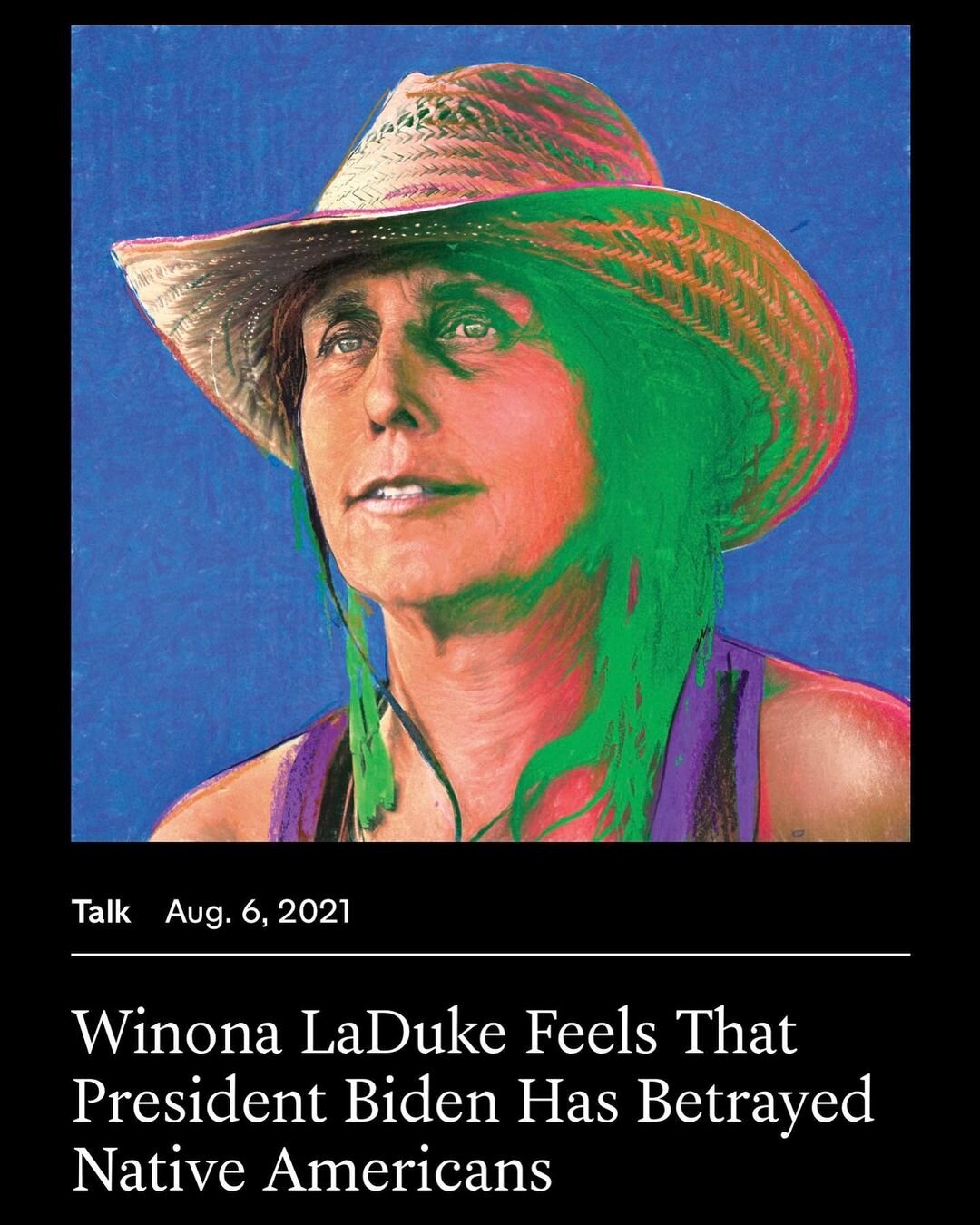Winona LaDuke Feels That President Biden Has Betrayed Native Americans
Right now in northern Minnesota, the Canadian oil-and-gas-transport company Enbridge is building an expansion of a pipeline, Line 3, to carry oil through fragile parts of the state’s watersheds as well as treaty-protected tribal lands. Winona LaDuke, a member of the local Ojibwe tribe and a longtime Native rights activist, has been helping to lead protests and acts of civil disobedience against the controversial $9.3 billion project. “I spend a lot of time,” she says, “fighting stupid ideas that are messing with our land and our people.” The Biden administration declined to withdraw federal permits for the project, a stance that Line 3 opponents see as hypocritical given the president’s cancellation of the Keystone XL pipeline as well as his vocal support for climate action. “I have had the highest hopes for the Biden administration,” LaDuke says, “only to have them crushed.”
Winona LaDuke is one of the world’s most tireless and charismatic leaders on issues related to climate change, Indigenous rights, human rights, green and rural economies, grass-roots organizing, local foods, alternative sources of energy and the priceless value of clean water over a career spanning nearly 40 years of activism. Renowned and gifted writer.
Winona LaDuke, in 2007, she was inducted into the National Women's Hall of Fame
"Native American land rights activist, environmentalist, economist, politician, and author Winona LaDuke has spent her career working on a national level to advocate, raise public support and create funding for environmental groups. A graduate of Harvard and Antioch Universities, LaDuke has become known as a voice for Native American economic and environmental concerns around the globe.
LaDuke is an Anishinaabekwe (Ojibwe) enrolled member of the Mississippi Band Anishinaabeg. While attending Harvard University, LaDuke met Jimmy Durham, a well-known Native American activist, and her own interest in issues related to Native tribes began. At the age of 18, LaDuke spoke to the United Nations regarding Native American concerns.
After graduation, LaDuke moved to the White Earth Ojibwe reservation in Minnesota, where she became principal of the reservation high school. There, she quickly became involved in a lawsuit to recover lands promised to the Anishinaabeg people by an 1867 federal treaty. After four years of litigation the case was dismissed, prompting LaDuke to found the White Earth Land Recovery Project. The project’s mission centers on land recovery, preservation and restoration of traditional practices and the strengthening of spiritual and cultural heritage. In 1985, she established the Indigenous Women’s Network, a group devoted to increasing the visibility of Native Women and empowering them to participate in political, social, and cultural processes.
LaDuke is program director of the Honor the Earth Fund, a national advocacy group that seeks to educate and create public support and funding for native environmental groups. In 1998, her work was recognized by Ms. Magazine, which named her Woman of the Year. Four years earlier she was nominated by Time Magazine as one of the country’s fifty most promising leaders under the age of 40.
In 1996 and again in 2000 she was a vice-presidential candidate, joining Ralph Nader on the Green Party ticket. A mother of three, LaDuke has written extensively on Native American and environmental issues."
LaDuke has written many books:
Last Standing Woman (1997), novel, and newly released in 2015.
All our Relations: Native Struggles for Land and Life (1999), about the drive to reclaim tribal land for ownership
Recovering the Sacred: the Power of Naming and Claiming (2005), a book about traditional beliefs and practices.
The Militarization of Indian Country: Daughters of Mother Earth: The Wisdom of Native American Women
The Sugar Bush.
She has also co-written several other books including:
Conquest: Sexual Violence and American Indian Genocide
Grassroots: A Field Guide for Feminist Activism
Sister Nations: Native American Women Writers on Community
Struggle for the Land: Native North American Resistance to Genocide, Ecocide, and Colonization
Cutting Corporate Welfare
Ojibwe Waasa Inaabidaa: We Look in All Directions
New Perspectives on Environmental Justice: Gender, Sexuality, and Activism
Make a Beautiful Way: The Wisdom of Native American Women
How to Say I Love You in Indian
Earth Meets Spirit: A Photographic Journey Through the Sacred Landscape
Otter Tail Review: Stories, Essays and Poems from Minnesota's Heartland
COVER STORY
Rage Against the Machines: Giant loads of dirty fossil fuel equipment are going up the Columbia River
BY CAMILLA MORTENSEN
Photo credit Todd Cooper
COVER STORY
Rage Against the Machines: Giant loads of dirty fossil fuel equipment are going up the Columbia River
BY CAMILLA MORTENSEN
Photo credit Todd Cooper
Winona LaDuke is one of the world’s most tireless and charismatic leaders on issues related to climate change, Indigenous rights, human rights, green and rural economies, grass-roots organizing, local foods, alternative sources of energy and the priceless value of clean water over a career spanning nearly 40 years of activism.
Winona LaDuke is an Anishinaabekwe (Ojibwe) enrolled member of the Mississippi Band Anishinaabeg who lives and works on the White Earth Reservations, and is the mother of three children. She is also the Executive Director of Honor the Earth, where she works on a national level to advocate, raise public support, and create funding for frontline native environmental groups.
In 1994, Winona was nominated by Time magazine as one of America's fifty most promising leaders under forty years of age. She has been awarded the Thomas Merton Award in 1996, the BIHA Community Service Award in 1997, the Ann Bancroft Award for Women's Leadership Fellowship, and the Reebok Human Rights Award, with which she began the White Earth Land Recovery Project.
A graduate of Harvard and Antioch Universities, Winona has written extensively on Native American and Environmental issues. She is a former board member of Greenpeace USA and serves, as co-chair of the Indigenous Women's Network, a North American and Pacific indigenous women's organization. In 1998, Ms. Magazine named her Woman of the Year for her work with Honor the Earth.
She has written extensively on Native American and environmental issues. Author of now six books, including The Militarization of Indian Country (2011), Recovering the Sacred: the Power of Naming and Claiming (2005), the non-fiction book All our Relations: Native Struggles for Land and Life (1999, South End Press), and a novel - Last Standing Woman (1997, Voyager Press).
Winona's editorials and essays have also been published several times in national and international journals and newspapers. Links to a few of her more recent articles can be found at www.welrp.org.
Winona is also known for speaking on the following topics:
Native American Women: Finding the Voice to Safeguard Mother Earth
Creating a Multi-Cultural Democracy: Religion, Culture & Identity in America
The Next Energy Economy: Grassroots Strategies to Mitigate Global Climate Change & How We Move Ahead
Seed Sovereignty: Who Owns the Seeds of the World, Bio-Piracy, Genetic Engineering & Indigenous Peoples
Mothers of Our Nations: Indigenous Women Address the World
“CHRONICLES: Winona LaDuke’s latest book reads like a prayer. These are holy words— inspirational stories taken straight from the heart of indigenous communities throughout the world. The Winona LaDuke Chronicles: Stories From the Front Lines in the Battle for Environmental Justice is lyrical, instructional, and infused with wry humor when the weight of the message becomes unbearable. LaDuke provides a roadmap through tribal nations’ belief systems; offering a spiritual compass and invaluable insight into the relationship of prophesy to the realities of climate change, economic collapse, food scarcity and basic human rights. As it happens, prophesy does come true and redemption is possible despite this encyclopedia of environmental and spiritual insults.”
“CHRONICLES: Are we hell-bent on embracing environmental calamity or is atonement and redemption possible through the lessons offered by indigenous belief systems? How fascinating to learn that corn has a history, that seeds have a profound spiritual meaning, and that plants have a sacred relationship with humans. Provide the environment in which food will flourish and there will be no need for genetic crop engineering.
LaDuke is one of the great overlooked orators of our time, and she brings this prowess to every page.”
“Last Standing Woman, “A powerful and poignant novel tracing the lives of seven generations of Anishinaabe (Ojibwe/Chippewa).’...an impressive fiction debut....skillfully intertwines social history, oral myth and character study....””
“In 1997, Ms. Magazine named Winona LaDuke (Anishinaabeg) Woman of the Year. That same year, the activist also debuted her first novel, Last Standing Woman.
”
“Last Standing Woman, “A fine work; recommended for both public and academic libraries.” ”
“1994, Winona was nominated by Time magazine as one of America’s fifty most promising leaders under forty years of age. A two-time vice presidential candidate on the Green Party ticket, LaDuke is the executive director of environmental non-profits the White Earth Land Recovery Project and Honor the Earth. She has worked extensively to raise the political awareness and clout of Native American tribes.”
“Last Standing Woman was originally released in l997, after many years of work and rewrites. Penned during my second pregnancy, I cannot explain the novel. Only, that my many years of historic research and oral history spoke to me in a form which was fiction. I have not been able to write fiction since, and love this story. The Ojibwe was originally penned by Earl Nyholm, my teacher and friend at Bemidji State university for many years. His writing, challenged me, and we ended up with an interpreted and corrected form ... with the help of the Transparent Language project and my language editors. I am honored for this help from Mary Fon, Bineshii Hermes-Roach, Mike Sullivan, and John Nichols. I am grateful. Chi-miigwech aapijii.
This book is a story of my community, the White Earth reservation, spanning some seven generations in the past and into the present (when written it was a futuristic novel), the intention was to tell our stories and discuss some of what might come. ”
“The LaDuke Chronicles “I have lived much of my life on the road Like my mother and father before me, I travel- from one tribal nation to another, from University to College, regulatory hearing, court room, to the United Nations; and then home. This is the book of those travels, a privileged life indeed. In this space people share their stories, or, just at that moment, a story unfolds as I watch; pen in hand.””
“The LaDuke Chronicles, “In the North American first world, tribal communities and first nations struggle just to survive. In our resilience and beauty, these stories are inspired.””












